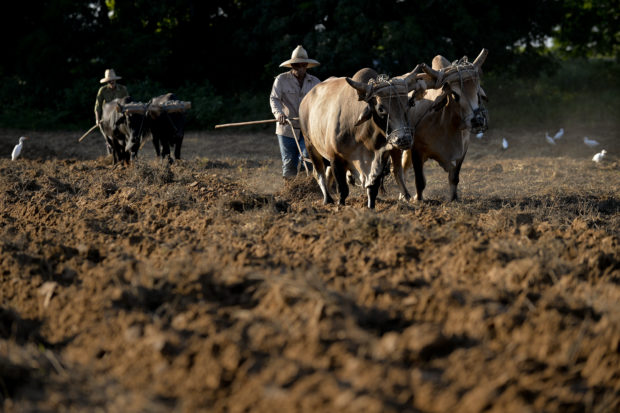Oxen, horses back to farm work due to fuel shortage

BLESS THE BEASTS Farmers work in a field using oxen to plow the land in Los Palacios, Pinar del Rio province, Cuba. Due to lack of fuel, Cubans have resorted to animal traction to boost agriculture and transport goods and people in rural areas. —AFP
LOS PALACIOS, CUBA—Lack of fuel, in large part due to the US blockade, is forcing Cubans to return to horse and ox power for farming, transport and everyday travel.
In Los Palacios, 100 kilometers west of the capital Havana, Heriberto Piloto bellows at his oxen “Montezuelo” and “Pasajero” as they plow a tobacco field at “La Juanita” farm.
Once, the fields were plowed by tractors, plus some animal help, but now beasts of burden are the only option, meaning the job of plowman has made a comeback, too, in Cuba’s fields.
“Under normal conditions, we always used animals and … given the country’s fuel restrictions, we’ve had to increase this activity,” said Alfredo Reynoso, the director of the state company Cubaquivir, which provides services to the 12 agricultural cooperatives in Los Palacios.
“We need to prepare around 1,200 hectares of land with animal power during the cold season,” Reynoso added.
Article continues after this advertisementNo buses
A thousand kilometers to the east, long, straight roads flanked by sugarcane fields lead to Havana.
Article continues after this advertisementThere, “Dragau” and “Abre Campo” pull an ox cart driven by Felix Betancourt, a 65-year-old bringing food to field workers.
“I bring food to cooperative workers: breakfast, lunch. It works well, it saves a lot of things, (including) fuel, given that there is none any more,” said Betancourt. “The animals’ fuel is grass. In the evening, I give them food, leave them to sleep well, then I get up the next morning and put them to work at 5:30 a.m.”
In the eastern city of Bayamo, horse-drawn carriages have long been a tourist attraction. Today, they’ve become an integral part of the public transport system.
“Carriages have always been used in Bayamo, but now they’re being used a bit more,” said Silvia Diaz, a neighborhood leader. “There are neighborhoods where there are no buses, but there are carriages.”
Rides cost between two and five pesos (between two and five US dollars).
In recent weeks, garbage disposal has been carried out by carts pulled by animals.
“It’s helping to keep the neighborhood clean and avoid fuel expenses,” she said.
Not enough beasts
US sanctions against Cuba and its main source of oil, socialist ally Venezuela, forced the island nation to operate with just 30 percent of its fuel needs in September.
October was better, but still Cuba had only 60 percent of its requirements.
“You can’t say that the lack of fuel hasn’t been felt,” said Jorge Luis La Guardia, the 50-year-old president of one of Los Palacios’ agricultural cooperatives.
It’s not the first time that Cuba has had to revert to the use of pack and draught animal.
The government encouraged their use during the economic crisis of the 1990s that followed the breakup of the old Soviet Union, which had been Cuba’s main foreign backer.
The problem is that Cuba doesn’t have enough beasts to take up the strain of silenced engines.
Los Palacios has 780 pairs of oxen, “insufficient” to meet the city’s needs, according to Reynoso.
“We’re transporting 100 percent of the farmers’ food to the population by pack animals, with oxen and carts, horse gigs and horse-drawn carriages,” said La Guardia.
Cuba has almost 200,000 pack animals, according to official data. —AFP